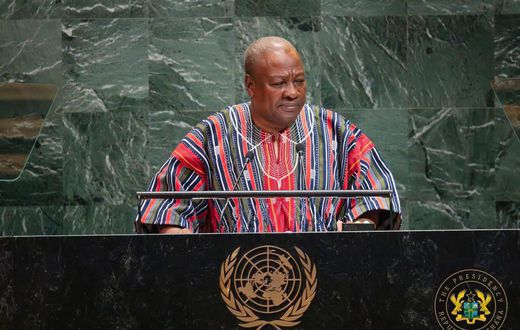A New African Assertiveness at the UN
In a powerful address at the 80th United Nations General Assembly, Ghana’s President John Dramani Mahama articulated a vision that marks a significant shift in Africa’s diplomatic posture. Moving beyond requests for aid, his speech was a bold demand for structural parity in global governance, grounded in Africa’s undeniable demographic future and Ghana’s own economic resilience . The speech, delivered on September 25, 2025, synthesized domestic success with a continental agenda, challenging the international community to finally heed the long-standing call for a more equitable multilateral system .
A Foundation of Domestic Turnaround
President Mahama leveraged Ghana’s recent economic achievements to legitimize his broader demands for global reform. He presented his administration’s “Resetting Ghana” agenda as evidence of African capacity for effective self-governance and macroeconomic management .
· Taming Inflation: The President reported a dramatic fall in Ghana’s inflation rate from 23.8% in December 2024 to 11.5% by August 2025, restoring price stability for citizens .
· Currency Performance: He highlighted that the Ghana cedi had been recognized by Bloomberg as the best-performing currency in the world at one point, a sign of growing investor confidence .
· The 24-Hour Economy: Mahama pointed to the 24-Hour Economy Initiative as a domestically driven policy poised to transform the economy and create better-paying jobs, fostering renewed public trust .
This domestic turnaround served as a powerful backdrop for his argument: Africa’s potential is not a future promise but a present reality, and global institutions must catch up .
The Core Demands: Reshaping Global Governance
Mahama’s address moved from national success to a pan-African blueprint for international justice, centering on several key demands.
1. UN Security Council Reform and a Permanent African Seat
A central pillar of the speech was the urgent call for reforming the United Nations Security Council (UNSC). President Mahama criticized the anachronistic structure where veto power is restricted to the five post-WWII powers, calling it a violation of the UN Charter’s principle of “sovereign equality of all its members” . He demanded that Africa be granted at least one permanent seat on the Security Council with veto power . Echoing Nelson Mandela’s call from three decades prior, Mahama also proposed that the General Assembly should have the power to challenge and review a veto by a permanent member, stating that “no single nation should be able to use a veto that is absolute to further its own interests” .
2. A Reset of the Global Financial Architecture
Beyond political representation, Mahama pressed for a fundamental restructuring of the global financial system, which he described as “rigged against Africa” . He argued that the current architecture perpetuates imbalances that hinder developing nations and insisted that Africa must have a greater say in the world’s multilateral financial institutions to support inclusive and sustainable growth .
3. Historical Justice and Reparations
In one of the most striking moments, President Mahama announced Ghana’s intention to table a UN motion recognizing the transatlantic slave trade as the “greatest crime against humanity” and to demand reparations . He framed this not just as a moral imperative but also as a historical responsibility, pointing to the hypocrisy of governments that had historically paid reparations to slave owners instead of the enslaved .
Principled Stances on Global Conflicts
Mahama used the platform to reaffirm Ghana’s principled, non-aligned foreign policy, taking strong positions on several international crises .
· Cuba: He called for the removal of the US blockade on Cuba, recalling that the “Cuban people shed their blood on African soil in the fight against apartheid” and stating that Cuba remains a faithful friend to Africa .
· Gaza: On the Middle East, he condemned the humanitarian crisis in Gaza and unequivocally supported a two-state solution. Using a vivid analogy, he stated, “If it looks like a duck, swims like a duck, and quacks like a duck, well then… it must be a duck,” challenging the international community to stop avoiding the reality of the situation .
· Sudan: He highlighted the conflict in Sudan as “the world’s largest humanitarian crisis,” noting that 12 million people have been displaced. He contrasted the limited global aid for these refugees with the extensive support offered to those from Ukraine, urging a dispensation of “euphemisms and dog-whistles” in discussions about migration from the Global South .
Africa’s Demographic Power: “The Future is African”
The bedrock of Mahama’s argument was Africa’s demographic destiny. Citing UN projections, he declared that “The future is African!” . By 2050, over 25% of the world’s population will be African, and one-third of all young people aged 15-24 will reside on the continent . He argued that this reality makes Africa a “catalyst for human potential and development,” whose role in authoring the world’s future will be “huge, and it will be consequential” . He challenged any view of Africa rooted in “centuries of racism, colonialism, imperialism, and the resulting implicit bias,” urging a recognition of the continent’s resilience and capacity for a “strong comeback” .
A Lasting Impact: From Town Square to Global Leadership
President Mahama framed the United Nations as the “proverbial town square” of the modern global village—a vital space for dialogue that must be protected from the corrosive effects of nationalism, disinformation, and algorithmic isolation . His speech signals a new chapter where Africa, leveraging its demographic weight, economic potential, and moral authority, is poised to transition from an object of international policy to a key agenda-setter . If his proposals gain traction, this address may be remembered as a turning point in Africa’s long struggle for recognition and equality within the global order .
🇬🇭Ghana’s President Mahama at the UN: From Aid Recipient to Agenda Setter for a New Global Order

Leave a Reply